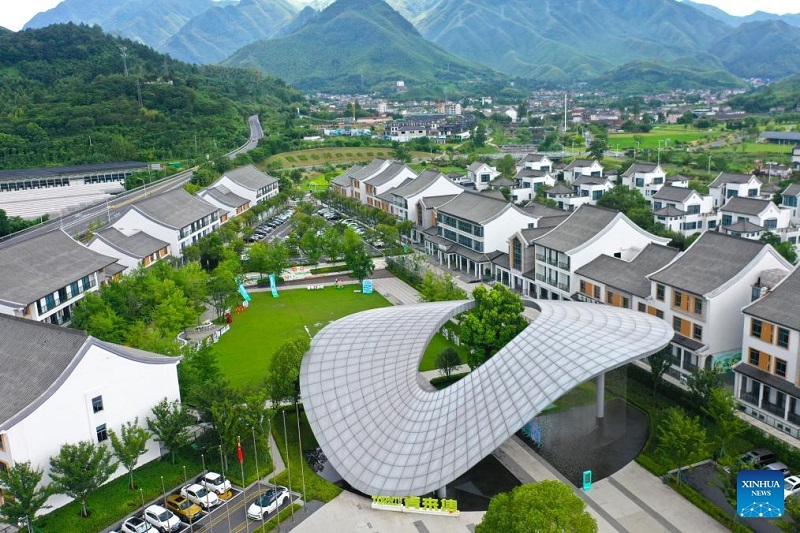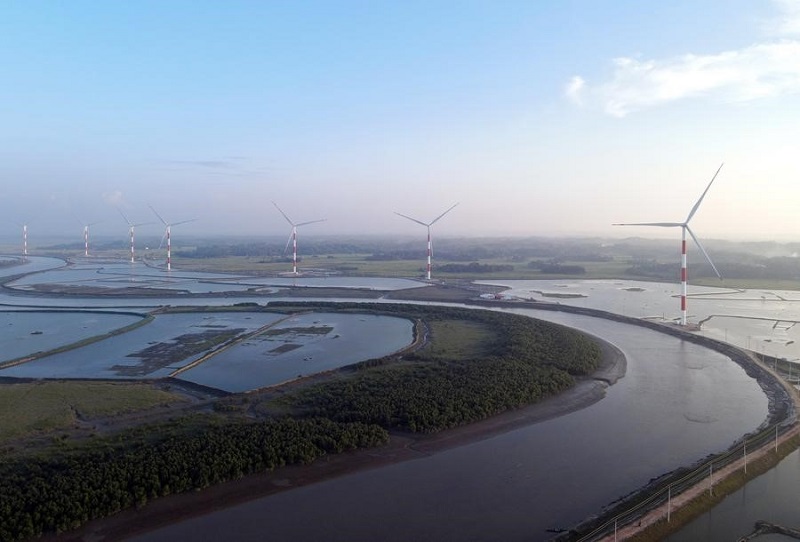Twenty years ago, during an inspection tour of the pollution-besieged village Yucun in Anji County, east China’s Zhejiang Province, then provincial Party Secretary Xi Jinping proposed that “lucid waters and lush mountains are invaluable assets” – a seminal insight now known as the “Two Mountains” Theory. This idea has evolved into a cornerstone of Xi Jinping Thought on Ecological Civilization, driving historic, transformative, and comprehensive shifts in China’s development paradigm. It dismantled the myth that economic growth and environmental protection are incompatible, replacing the “grow first, clean up later” model with a synergistic vision where ecology and economy thrive together. From a village’s experiment to a national strategy embedded in the Constitution of the Communist Party of China (CPC) and national legal frameworks, the concept “lucid waters and lush mountains are invaluable assets” has reshaped China’s development trajectory and inspired global sustainability efforts.

An aerial drone photo taken on Aug. 6, 2025 shows a young talent community at Yucun Village in Anji County of Huzhou City, east China's Zhejiang Province. Yucun Village was named one of the "Best Tourism Villages" by the United Nations World Tourism Organization in 2021. (Xinhua/Mao Zhu)
China has decoupled development from the emission-intensive model through unprecedented transitions. Now, non-fossil fuels account for 19.8 percent of its energy consumption, while renewable capacity approaches two billion kilowatts, reaching wind and solar power installation targets six years ahead of schedule. Since 2012, China’s carbon intensity has plunged 26 percent as the economy grew at an average annual growth rate of 6.1 percent, saving 1.4 billion tons of coal and cutting carbon dioxide emissions by three billion tons. Meanwhile, as the world’s largest renewable supply chain takes shape in the country, its exports of electric vehicles surpassed two million units in 2024. These strides prove that ecological investment spurs economic vitality.
Systematic restoration has turned environmental scars into assets. China’s forest coverage has exceeded 25 percent, making the country the global leader in reforestation. Over 18.5 million hectares of deserts have been greened, reversing the deserts into human settlements in the country’s northwest regions. Water quality epitomizes progress in pollution control: 90.4 percent of its rivers is now rated as good to excellent, while the main streams of the Yangtze and Yellow Rivers have maintained Grade II purity for five and three consecutive years respectively. Over the past decade, the average concentration of PM2.5 (particulate matter with a diameter of 2.5 micrometers or less) in China’s key cities has dropped by a cumulative 56 percent, reaching a historic low of 29.3 micrograms per cubic meter, slashing heavily polluted days by 92 percent and cementing China as the fastest-improving nation in air quality.
Yucun, the village which President Xi visited on August 15, 2005, once plagued by its dusty limestone mines and heavily polluting cement plants, now sees booming ecotourism, benefiting from its lucid waters and lush mountains. By 2024, it had attracted 1.22 million tourists, while the expanded Greater Yucun zone (spanning three towns) had welcomed 10 million visitors, generating RMB 10 billion in revenue. Now, the Greater Yucun focuses on three high-value new industries (new economy, cultural tourism, and agriculture). In 2023, the per capita income of its villagers exceeded RMB 70,000, clearly indicating improved lifestyles for locals. In 2021, Anji launched China’s first county-level bamboo forest carbon sink depository trading platform – turning fresh air into a marketable commodity through carbon credit transactions. Now, a good environment has literally become a cashable asset.

An aerial drone photo taken on Oct. 30, 2023 shows wind turbines of Cox's Bazar wind power project built by a Chinese company in Bangladesh. (Photo by Salim/Xinhua)
Zhang Xuanmeng, director of the Ecological Civilization Research Department at Zhejiang Academy of Ecological Civilization, observed, “Throughout industrial modernization, environmental protection was consistently subordinated to economic development – a mindset framing ecological conservation as antithetical to growth. The epochal significance of ‘lucid waters and lush mountains are invaluable assets’ lies in its fundamental breakthrough: shattering the myth that environmental safeguards hinder economic progress and overcoming the ‘grow first, clean up later’ paradigm. This establishes a new dialectical relationship where ecological protection and economic development reinforce each other complementarily.”
Former United Nations Under-Secretary-General Erik Solheim recently noted on the sidelines of the 2025 Green Low-Carbon Innovation Conference in Huzhou, Zhejiang Province, that China’s experience in green development has shown that a country can develop the economy while protecting and enhancing the natural environment at the same time.
Institutional diligence has turned conception into action. The theory was woven into China’s Five-Sphere Integrated Plan (a comprehensive development strategy that encompasses economic, political, cultural, social, and ecological progress), codified in the CPC Constitution, and enforced by laws like the Yangtze River Protection Law. The draft of a code on ecological and environmental protection, China’s second codified law, signals its serious legal commitment.

A herder checks the operation of a center-pivot irrigation system in an alfalfa field at the Livestock Demonstration Center in Idini village, Mauritania, July 18, 2025. (Xinhua/Han Xu)
In his speech delivered at the National Conference on Eco-environmental Protection on July 17, 2023, President Xi set store on efforts in intensifying the battle against pollution, accelerating the transition to a green and low-carbon development model, reinforcing the diversity, stability and sustainability of ecosystems, and working towards the goals of peak carbon and carbon neutrality.
The “Two Mountains” Theory’s wisdom also radiates to the rest of the world. In Mauritania, the China-Africa Green Technology Park initiative provides replicable and scalable solutions combating desertification while advancing green development. In Egypt, China’s water-saving terraces are adopted to green Sinai’s mountains. In the United Arab Emirates, Abu Dhabi now hosts the world’s largest solar farm, built by China. As Erik Solheim observed, China has proven that ecology isn’t a cost – it can be humanity’s wisest investment.
From Yucun’s tea fields to solar arrays in Africa’s Sahel, the “Two Mountains” Theory transcends borders, embodying a fundamental truth: development needs not to be sacrificed at nature’s altar. Today, it catalyzes global collaborations, from green finance to climate resilience training, proving ecological wisdom is humanity’s common heritage. Those who share the same vision need no mountains or seas to divide them, as the ancient Chinese wisdom reminds us. Within this vision, “lucid waters and lush mountains” illuminate a shared trajectory toward planetary renewal.